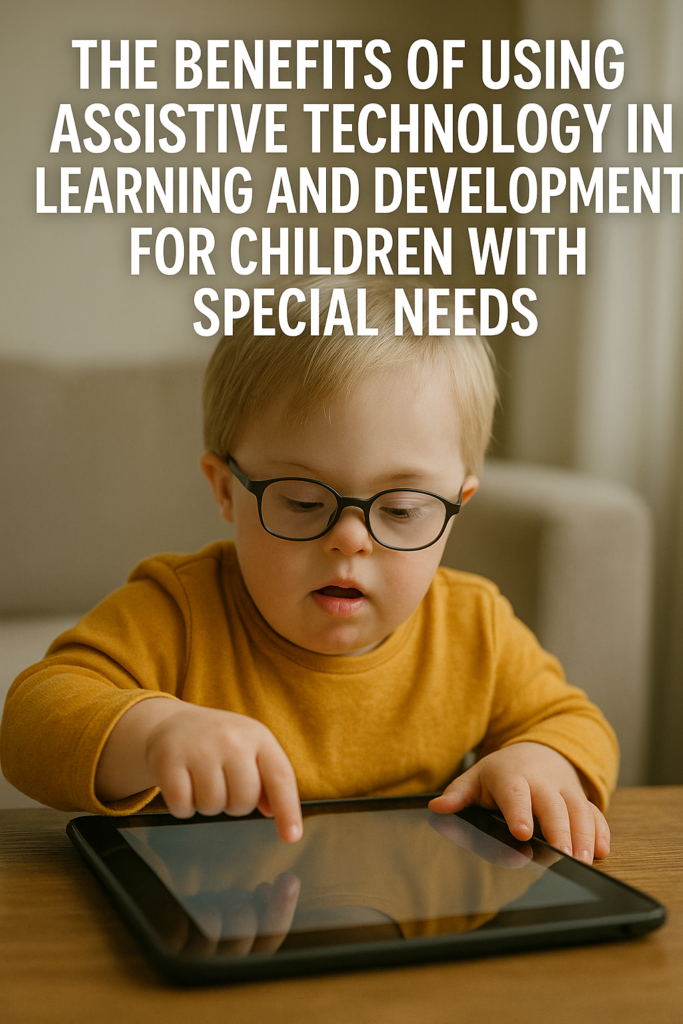
In today’s educational settings, assistive technology (AT) has become a crucial tool for children with special needs, enabling them to access learning materials and participate in educational activities alongside their peers. Assistive technology includes a wide range of devices, software, and equipment that are designed to help individuals with disabilities perform functions that might otherwise be difficult or impossible. For mothers of special needs children, understanding the benefits of these technologies can be empowering and transformative, both for them and their children.
Enhanced Accessibility
One of the primary advantages of assistive technology is its ability to make learning materials more accessible. For children with visual impairments, tools like text-to-speech software, screen readers, and magnification apps bridge the gap between traditional materials and their specific needs. Similarly, hearing-impaired children benefit from apps that translate speech into text in real-time, fostering inclusivity in classrooms and social settings. For mothers of special needs children, this accessibility not only empowers their child but also opens up opportunities to celebrate their unique learning moments. The journey can be both challenging and rewarding, as explored in Moments of Joy: Celebrating the Small Wins in Special Needs Parenting, a resource that highlights the importance of cherishing these transformative experiences.
Improved Communication
Communication is at the heart of learning and social connection, and assistive technology often becomes a vital tool for children who struggle with conventional speech. Devices like speech-generating tools and specialized communication apps enable these children to express themselves effectively. This advancement not only supports academic progress but also nurtures their self-confidence and ability to interact socially. For parents, especially mothers of special needs children, watching their child overcome communication barriers can be an emotional and uplifting experience. Love Without Limits: Understanding the Emotional Journey of Special Needs Parenting delves into the profound impact these milestones have on both the child and their family, offering insights and encouragement.
Personalized Learning Experiences
Every child learns differently, and this is particularly true for children with special needs. Assistive technology can tailor educational experiences to meet the individual needs of these children. Adaptive keyboards and switches allow children with physical disabilities to interact with computers and tablets to complete assignments and engage in interactive learning activities. Meanwhile, cognitive learning software adapts to the pace and ability level of the user, facilitating a customized learning experience that is suited to their unique needs.
Increased Independence
For many children with special needs, achieving independence is a powerful step forward in their development. Assistive technology provides them with tools to complete tasks autonomously, from mobility aids that navigate school hallways to educational software that guides them through learning exercises. This newfound freedom boosts their confidence, motivation, and overall sense of self-worth. Mothers of special needs children often find that their child’s independence transforms their dynamic as a family, creating opportunities for shared pride and celebration. For guidance on balancing these milestones with personal well-being, Finding Your Path: A Guide to Self-Care for Mothers of Special Needs Children is an invaluable resource, helping parents navigate the complexities of their caregiving roles.
Bridging the Educational Gap
Assistive technology plays a crucial role in bridging the gap between children with special needs and their peers. With the right tools, children can achieve academic milestones that may have previously seemed out of reach. This not only fosters their self-esteem but also promotes social inclusion and emotional well-being. For mothers of special needs children, advocating for these technologies means opening doors to a more equitable and fulfilling educational experience for their child. Recognizing these successes and celebrating them, no matter how small, can create lasting memories. In Moments of Joy: Celebrating the Small Wins in Special Needs Parenting, parents can find inspiration to appreciate these moments and build on them.
Support for Mothers and Educators
The benefits of assistive technology extend beyond children; they also provide critical support to the mothers and educators involved in their journey. Technology simplifies tracking progress, creating customized learning plans, and adapting strategies to meet a child’s evolving needs. For mothers, these tools are not just practical aids—they represent hope and empowerment as they navigate the complexities of special needs parenting. The emotional resilience and strength required in this role are thoughtfully explored in Love Without Limits: Understanding the Emotional Journey of Special Needs Parenting, which offers a compassionate lens on how technology and emotional growth go hand-in-hand.
Conclusion
The integration of assistive technology in learning and development for children with special needs offers numerous benefits that extend beyond the classroom. It empowers these children to overcome barriers, participate fully in their educational journey, and achieve greater independence. For mothers of special needs children, investing in and advocating for advanced assistive technologies is not just about providing support—it’s about opening up a world of opportunities for their children to explore and thrive in. As we continue to see advancements in this field, the potential for transformative educational experiences becomes even more promising.


